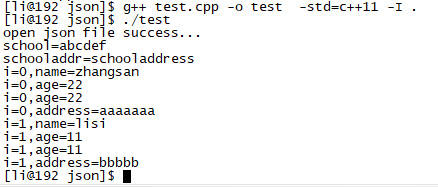c++ 使用nlohmann_json库解析json文件
c++解析json文件,可以用开源库nlohmann_json
nlohmann_json下载地址
安装说明
centos 7环境下:
(1)下载源码
$ git clone https://gitee.com/yejiqin/nlohmann_json.git
如果没有安装git命令,root权限下,安装git:
#yum install git -y
编译源码要用到cmake,如果没有安装,可以参考以下文章:
cmake安装说明
(2)下载到本地后,进入源码目录,编译
$cd nlohmann_json
$mkdir build && cd build
$cmake …
$make
$sudo make install
下载后也可以不用编译,把nlohmann_json\include\nlohmann\json.hpp文件和nlohmann_json\include\nlohmann文件夹放到项目目录就行。
本文采用不编译的方式
1、解析无结构json文件
config.json
{
"name": "zhangsan",
"age": 20,
"address": "xxxxxxxxx"
}
这种简单结构的json文件,可以直接用 json.at(typename) 读取数据出来。
test.cpp
#include "json.hpp"
#include 编译
g++ test.cpp -o test -std=c++11 -I .
2、单层结构json
config.json
{
student:{
"name": "lisi",
"age": 11,
"phone": "123456789",
"address": "aaaaaaa"
}
}
上面的json文件,类似于c++的结构或者类,可以用结构体表示出来,
namespace nc{
struct student
{
string name;
int age;
string phone;
string address;
};
void from_json(const json& j, student& s)
{
/* 从“student”结构的元素中取出数据,放到s中 */
j.at("name").get_to(s.name);
j.at("age").get_to(s.age);
j.at("phone").get_to(s.phone);
j.at("address").get_to(s.address);
}
struct all
{
student stu;
};
void from_json(const json& j, all& s)
{
j.at("student").get_to(s.stu);
}
}
为什么要用namespace,源码中有说明:
Those methods **MUST** be in your type's namespace (which can be the global namespace), or the library will not be able to locate them
大概意思是用户重载的方法,如from_json(),必须要放在自定义namepace中,否则json库会找不到该方法。
如果用户的方法和main()函数放在同一个cpp文件,可以不用namespace,不过尽量还是按照规则去做。
test.cpp
#include "json.hpp"
#include 编译
g++ test.cpp -o test -std=c++11 -I .
3、多层结构json
config.json
{
"public":{
"school":"abcdef",
"address":"schooladdress"
},
"students":{
"student":[
{
"name": "zhangsan",
"age": 22,
"phone": "123456",
"address": "aaaaaaa"
},
{
"name": "lisi",
"age": 11,
"phone": "123456789",
"address": "bbbbb"
}
]
}
}
test.cpp
#include "json.hpp"
#include 编译
++ test.cpp -o test -std=c++11 -I .



